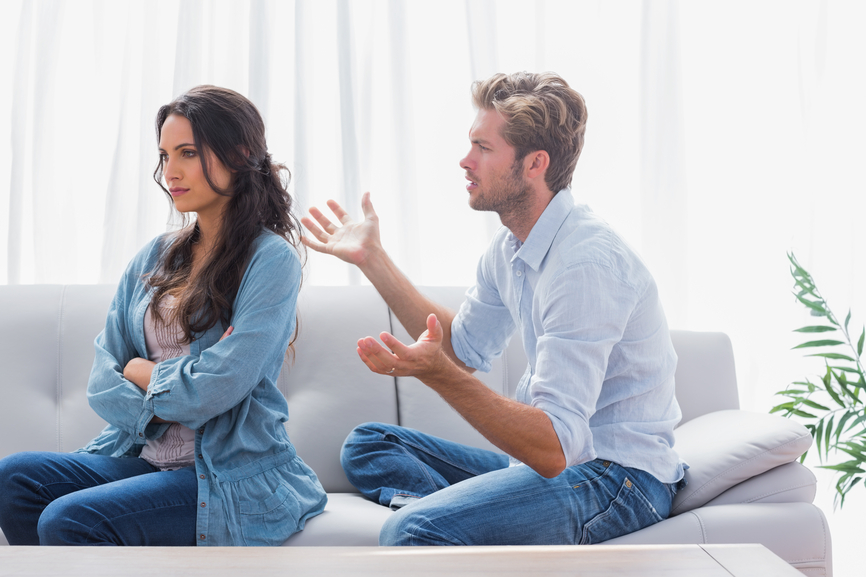Many couples I work with come in with a good amount of stress and difficulty. The causes sometimes vary, but the behaviors people use to respond to the upset are often predictable. People who start out loving each other sometimes find themselves so burdened by stress and difficulty they end up feeling frustrated in the relationship.
No one starts out being frustrated. Frustration comes after being unhappy, sometimes for a long time. Often couples with the best intentions end up not being able to explain themselves to each other, or they won’t say what they really want to say and as a result they feel tense, stressed and often times frustrated.
Frustration can appear in many ways. It may come out as a curt answer to a question. Maybe it’s a rolling of the eyes, or a “whatever” response to a partner or no response at all. Frustration can also be felt when one person ignores the other altogether.
Sometimes frustration is a slammed door, or a sigh. It’s a sign of exasperation from the frustrated person to the other telling them something is very wrong. It also broadcasts unhappiness and discontent. And it’s a problem. It keeps the frustrated person trapped in difficulty and leaves the other partner in the dark regarding the source of the problem.
What would be helpful is to discover how to talk about what doesn’t feel good in the relationship. Unfortunately this is often difficult for couples who have not communicated with each other for a while.
If you find yourself answering your mate with frustrated gestures you might want to think about what is happening to you. I am sure you did not start out being unfriendly to your beloved. I am pretty sure you used to have very soft, loving responses in the early days. Maybe as time passed you found yourself unable to express your thoughts and feelings to your partner without worrying how he or she might react. It’s possible you may even have started keeping your thoughts and feelings to yourself, not wanting to bother your mate. But the more you kept your thoughts and feelings inside without speaking them, the more you might have felt yourself becoming stressed and uncomfortable.
This is the body’s natural response to too much tension. This tension is a clear message about what it feels like when you can’t express yourself and you keep your feelings inside. You might have a sensation of all your feelings being trapped inside your own body and you can’t let them out, like you are frozen. You keep yourself suppressed and you suffer. At first you might be able to manage your increased stress. Maybe you exercise more or take up an activity. Maybe you yell at the kids instead or a co-worker. Perhaps you overindulge; too much alcohol, drugs, or food. You do what ever you can to find ways of letting off steam and tension.
This helps you survive difficulty and maintain, but it doesn’t help repair the problems between you and your mate. The more you figure out how to manage your challenges, the more you might be looking at your partner with distain. You may start to believe that he or she just doesn’t care about what you think and feel. That’s when people start with the one word answers, or the disinterest, or the shaking of the head. These behaviors tell the other person you are not interested in them. These reactions indicate that you are unhappy.
If you are unhappy in your relationship take stock of how you are feeling right now. Ask yourself, “Am I stressed and unable to talk to my partner about what is bothering me?” If you answer yes start looking at the ways you do talk to your mate. Are you short and abrasive? Do you dismiss him or her? Do you just not bother because you don’t think anything will change?
If you answered yes to any of these questions you just might be living with frustration.
So how do you change your situation? You just took the first step. You recognized it. From here you might want to talk to someone; a friend, family member, religious mentor or counselor. Get your long held feelings from inside yourself, outside your head by communicating them. Try and understand what is preventing you from talking to your mate about these feelings. Learn why you stay silent.
You will likely feel better even after just a few sessions. You could also learn different ways to communicate your feelings that may give you confidence. When you leave your old behaviors; the eye rolling, sarcastic responses, non answers, and replace them with true expressions of your feelings a number of things might also happen. Your stress and tension may decrease, and it’s possible you might even begin to experience some happiness, and that might feel pretty great.
Send you comments to linda@lindanusbaum.com
www.lindanusbaum.com
Read More

